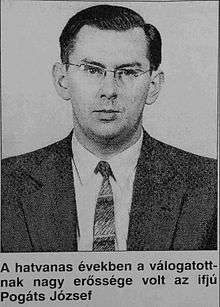József Pogáts
József Pogáts (10 July 1928 – 18 March 2004), was a Hungarian chess FIDE Master (1983) and chess composer, European Team Chess Championship two-times team bronze and individual silver medals winner (1961, 1965).
| József Pogáts | |
|---|---|
 | |
| Country | Hungary |
| Born | 10 July 1928 Budapest, Hungary |
| Died | March 18, 2004 (aged 75) Budapest, Hungary |
| Title | FIDE Master (1983) |
Biography
In 1951, József Pogáts received a doctorate in law from University of Budapest. From 1951 to 1959 he worked as a chess instructor, from 1959 to 1971 he was an internal auditor at the Hungarian Investment Bank, and from 1971 to 1981 he worked as a lawyer in the Ministry of Metallurgy and Machine-Building of Hungary.
In Hungarian Chess Championship József Pogáts participated sixteen times (1950-1972). In his first championship he showed the best result, shared the 3rd - 4th place and received a bronze medal and the title of national master. In 1958 he was the 6th, in 1961 he shared the 5th - 7th place, also took the 6th place in 1962, and in 1966 he shared the 4th - 5th place.
József Pogáts represented the national team of Hungary in the largest team chess tournaments:
- in Chess Olympiad participated in 1952;[1]
- in European Team Chess Championship participated two times (1961, 1965) and both time won bronze medal in the team event and silver medal in individual event.[2] At the European Team Championship in 1961, he distinguished himself by his victory over the Soviet chess grandmaster Lev Polugaevsky, which he gained in 18 moves in Sicilian Defense.[3]
At the international tournament in Debrecen in 1961, József Pogáts fulfilled the norm of the chess international master, but the FIDE did not assign him this title. Only in 1983, when FIDE introduced the title of FIDE Master, he was one of the first players who received this title.
József Pogáts was also known as Chess composer. He published his first task in 1943, and was seriously engaged in Chess problem since 1966. József Pogáts worked mainly in the genre Fairy chess. His works were often published in the most prestigious edition for chess problemists - FIDE Album.[4]
References
- "OlimpBase :: Men's Chess Olympiads :: József Pogáts". www.olimpbase.org.
- "OlimpBase :: European Men's Team Chess Championship :: József Pogáts". www.olimpbase.org.
- "Jozsef Pogats vs Lev Polugaevsky (1961)". www.chessgames.com.
- "Mikitovics János MAGYAR SAKKSZERZŐK - ARCKÉPEK ÉS MŰVEK - Dr. Pogáts József". www.magyarsakkszerzok.hu.
External links
- József Pogáts player profile and games at Chessgames.com
- József Pogáts chess games at 365chess.com
- József Pogáts chess games at pdb.dieschwalbe.de